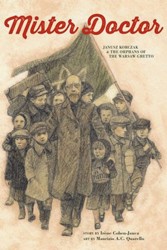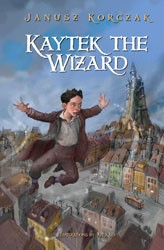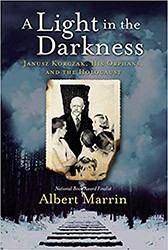The Polish physician and educator Janusz Korczak (1878−1942) was born Henryk Goldszmit and raised in an assimilated Jewish family in Warsaw. Highly influential during his lifetime for his progressive pedagogical methods, he is best known today as the man who accompanied the children from his orphanage into the gas chambers of Treblinka. In the Teacher of Warsaw, Mario Escobar tries to recreate Korczak’s complexities, which have largely been erased by his martyrdom during the Holocaust. This work of historical fiction presents a hero facing unbearable pressures as he tries to protect his young charges from the Nazis. Deeply committed to his work, yet also tortured by doubts about his decisions, this great humanitarian is also simply a man trapped by history.
The novel takes the form of Korczak’s diary entries. As Escobar makes clear in his afterword, these are invented, only inspired by the actual, brief document that Korczak left behind. They include reminiscences of childhood, meditations on Jewish heritage, and detailed accounts of the agonizing situation of Poland’s Jews. Korczak interacts with many historical persons, giving insights into the impossible choices that confronted them. The head of Warsaw’s Jewish Council, Adam Czerniakow, deludes himself into thinking that he is staving off disaster by cooperating with the Nazi regime, yet Korczak shows great empathy for his predicament. Marceli Godlewski, meanwhile, is a Catholic priest and noted antisemite whose past dissemination of hatred is, to Korczak, redeemed by his present willingness to help Jews escape. As Korczak articulates, one can view life through a microscope or a telescope. Each individual action may seem insignificant, but enlarged and viewed as a whole, “everything seems to fulfill a particular purpose.”
Escobar does not idealize the novel’s Eastern European setting. Korczak refers to barbaric acts committed by populations in Poland, Ukraine, and beyond against their Jewish neighbors. At the same time, there are relatively few scenes of Jewish religious life. One moving description of a wedding in the Warsaw ghetto contains significant errors — somewhat surprising, considering the author’s careful attention to historical details elsewhere in the novel. In other words, Escobar presents a narrative in which both Jewish strength and Jewish victimhood emerge.
One thought that Korczak records in his diary seems to reflect the author’s viewpoint more than his hero’s. Janusz Korczak did not come from a religiously observant family; his eclectic philosophy embraced a variety of secular and religious teachings. The novel refers to Jesus numerous times, implying that Christianity had a strong influence on this Jewish thinker. Korczak states, “I could not deny that I admired many things about Jesus … his love for his enemies, his desire for peace, his mercy.… Sometimes Judaism felt too pessimistic to me … ” He even draws on Jesus’s teachings about children to suggest that passivity and acceptance are necessary to salvation.
Nevertheless, The Teacher of Warsaw is a nuanced fictionalization, and it may motivate readers to learn more about the real man behind it — whose tragic circumstances left him unable to save the Jewish children in his care.
Emily Schneider writes about literature, feminism, and culture for Tablet, The Forward, The Horn Book, and other publications, and writes about children’s books on her blog. She has a Ph.D. in Romance Languages and Literatures.




